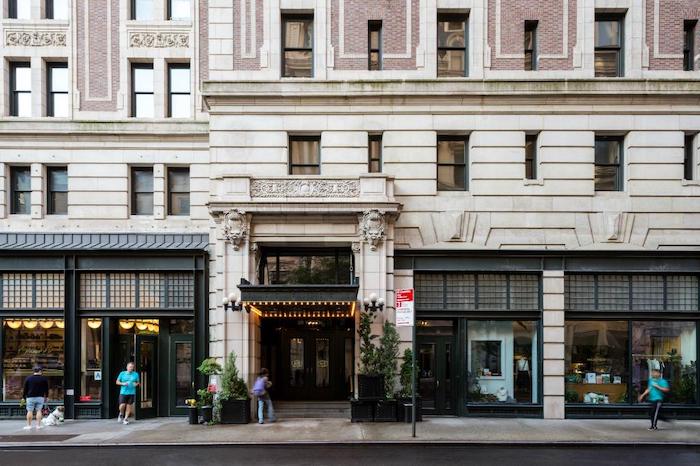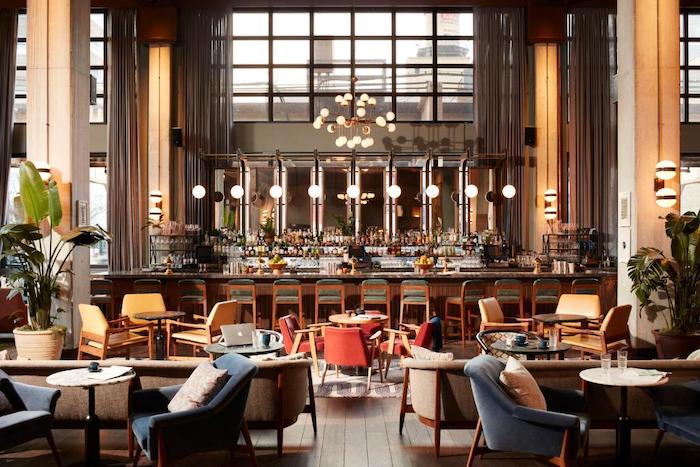Hotels are no longer just places to sleep, but destinations that offer unique experiences. However, the demand for new hotels is growing faster than the construction of new buildings. This is where the concept of hotel conversions comes in.

Hotel conversions involve repurposing existing buildings such as offices, warehouses, and hospitals into hotels. This trend has gained momentum in recent years due to the shortage of available land for new construction, the desire to preserve historic buildings, and the need for cost-effective hotel development.
The importance of hotel conversions cannot be overstated in the hospitality industry. They provide a way to create new hotels without requiring the construction of new buildings, which can be costly and time-consuming. Additionally, they allow developers to leverage existing infrastructure, such as plumbing and electrical systems, reducing the overall cost of development.
The trend of converting offices into hotels has become increasingly popular. As many companies have shifted towards remote work, office buildings have become vacant, presenting a unique opportunity for developers to transform these spaces into hotels. By repurposing these buildings, developers can provide much-needed hotel rooms in urban areas where land is scarce.
In this post, we will discuss the benefits and challenges of turning offices into hotels and how this trend is transforming the hospitality industry. By understanding the advantages and obstacles associated with hotel conversions, developers can make informed decisions about whether to embark on such projects.
Benefits of Hotel Conversions
Hotel conversions are becoming an increasingly popular trend in the hospitality industry. This is because they offer numerous benefits to developers, hoteliers, and travelers. Here are some of the most significant benefits of hotel conversions:
A. Increased Supply of Hotel Rooms
One of the most significant benefits of hotel conversions is that they provide an increased supply of hotel rooms in areas where there may be a shortage. This is particularly important in urban areas where land is scarce, and the cost of building new hotels can be prohibitive.
Hotel conversions provide a way to create new hotels without the need for new construction, which can be time-consuming and expensive. By repurposing existing buildings, developers can provide much-needed hotel rooms in areas where there is a high demand for accommodation.
B. Revitalization of Historic Buildings
Another significant benefit of hotel conversions is that they can help to revitalize historic buildings. Many historic buildings have been left abandoned for years, and their restoration can be expensive. However, by converting them into hotels, developers can breathe new life into these buildings and preserve their historic significance.
Furthermore, historic buildings are often located in prime locations in urban areas, making them ideal for hotel conversions. By repurposing these buildings, developers can create unique and memorable hotel experiences that can attract travelers who are looking for something different.
C. Cost Savings for Developers
Hotel conversions can also provide significant cost savings for developers. Converting an existing building into a hotel can be much more cost-effective than building a new hotel from scratch. This is because the infrastructure for the building is already in place, which can reduce the cost of construction significantly.
Furthermore, repurposing existing buildings can also reduce the time it takes to develop a hotel. The planning and construction process can be much quicker than building a new hotel, allowing developers to start generating revenue sooner.
D. Attractive Amenities for Travelers
Finally, hotel conversions can provide attractive amenities for travelers. Many repurposed buildings offer unique features that are not typically found in traditional hotels. For example, an old factory building may have large open spaces that can be used for events or conferences, while a converted hospital may have a spa or wellness center.
Furthermore, many repurposed buildings offer unique design elements that can make a hotel stay more memorable. From exposed brick walls to high ceilings, these features can create a unique ambiance that travelers will remember long after their stay.
In summary, hotel conversions offer numerous benefits to developers, hoteliers, and travelers. They provide an increased supply of hotel rooms, can revitalize historic buildings, offer cost savings for developers, and provide attractive amenities for travelers. As such, hotel conversions are a trend that is transforming the hospitality industry and one that is likely to continue in the future.
Read: The Rise of Wellness Resorts in Real Estate
Challenges of Hotel Conversions
While hotel conversions offer many benefits, they also present several challenges that developers must consider. Here are some of the most significant challenges of hotel conversions:
A. Legal and Regulatory Hurdles
One of the biggest challenges of hotel conversions is navigating the legal and regulatory hurdles that come with repurposing an existing building. Depending on the building’s location and intended use, there may be a variety of zoning laws and building codes that must be followed.
For example, the building may need to be retrofitted to comply with fire safety regulations or accessibility laws. Developers may also need to obtain various permits and approvals from local government bodies before beginning construction.
B. Building Codes and Zoning Restrictions
Another significant challenge of hotel conversions is complying with building codes and zoning restrictions. Existing buildings may not be up to code or may not meet current zoning requirements for a hotel. This can make it difficult to repurpose the building without significant modifications.
For example, if the building was originally designed for office space, it may not have enough exits or stairwells to meet hotel code requirements. Developers may need to invest in significant modifications to bring the building up to code, which can be costly and time-consuming.
C. Limited Space for Amenities and Guest Rooms
Another challenge of hotel conversions is limited space for amenities and guest rooms. Many existing buildings were not originally designed to be hotels and may not have the necessary space for amenities such as pools, spas, or fitness centers.
Additionally, the layout of the building may not be conducive to creating guest rooms. For example, a former warehouse may have high ceilings but limited floor space, which may make it difficult to create comfortable guest rooms. Developers may need to get creative with their use of space to create a functional hotel within the existing building.
D. Construction Challenges and Costs
Finally, hotel conversions can present significant construction challenges and costs. Existing buildings may require extensive renovations or modifications to meet the needs of a hotel. This can be particularly challenging if the building has historical significance or unique architectural features that must be preserved.
Furthermore, the cost of repurposing an existing building can be higher than building a new hotel from scratch. Developers may need to invest in significant upgrades to the building’s plumbing, electrical, or HVAC systems to bring them up to modern standards. These costs can quickly add up, making hotel conversions a more expensive option than building a new hotel.
Overall, hotel conversions present several challenges that developers must consider before embarking on such projects. They must navigate legal and regulatory hurdles, comply with building codes and zoning restrictions, work within limited space for amenities and guest rooms, and deal with significant construction challenges and costs. While these challenges can be daunting, they can be overcome with careful planning and execution, resulting in a successful hotel conversion.
Read: From Vacant Land to Hotel Empire: Success Stories
Turning Offices into Havens
Office-to-hotel conversions are a popular trend in the hospitality industry, providing a way to repurpose vacant office buildings into hotels. While these conversions come with their own set of challenges, they also offer unique design opportunities that can create a memorable guest experience. Here are some key considerations for turning offices into havens:
A. Examples of Successful Office-to-Hotel Conversions

Several office-to-hotel conversions have been successful in recent years, providing inspiration for developers and hoteliers. For example, the Ace Hotel in New York City was once the site of a cooperative office building. The developers preserved many of the original features, such as the exposed brick walls and high ceilings, while adding modern amenities such as a rooftop bar and restaurant.

The Hoxton Hotel in Chicago is another example of a successful office-to-hotel conversion. The building was originally designed as a warehouse but had been used as an office building for many years. The developers preserved the original terracotta facade while adding modern touches such as an open-plan lobby and restaurant.
B. Design Considerations for Office-to-Hotel Conversions
When converting an office building into a hotel, several design considerations must be taken into account. For example, the layout of the building may need to be modified to create comfortable guest rooms. Developers may need to add additional soundproofing to reduce noise from neighboring rooms or the street outside.
Additionally, the building’s facade may need to be updated to create a more welcoming entrance for guests. The lobby and common areas must be designed to create a warm and inviting atmosphere, with comfortable seating areas and attractive lighting.
C. How to Transform Office Spaces into Welcoming and Comfortable Guest Rooms
Transforming office spaces into welcoming and comfortable guest rooms can be a challenge, but it is essential to the success of the hotel. Developers must carefully consider the layout of the room, ensuring that it is functional and comfortable for guests.
For example, developers may need to add additional insulation to the walls to create a quieter and more peaceful space. They may also need to add windows or skylights to bring natural light into the room. Additionally, the room’s furnishings must be carefully chosen to create a cozy and welcoming atmosphere.
D. Maximizing Amenities and Common Areas in Converted Hotels
One of the advantages of repurposing an existing building into a hotel is that the building may already have unique features that can be used as amenities or common areas. For example, an old office building may have a rooftop terrace that can be transformed into a bar or restaurant.
We Design & Develop Websites, Android & iOS Apps
Looking to transform your digital presence? We specialize in creating stunning websites and powerful mobile apps for Android and iOS. Let us bring your vision to life with innovative, tailored solutions!
Get Started TodayDevelopers must carefully consider how to maximize the use of these spaces to create a memorable guest experience. They may need to add additional seating or lighting to create a comfortable atmosphere. Additionally, the amenities offered must be tailored to the building’s unique features to create a cohesive and immersive guest experience.
In a nutshell, turning offices into havens is a trend that is transforming the hospitality industry. By carefully considering design considerations, transforming office spaces into comfortable guest rooms, and maximizing the use of common areas and amenities, developers can create a memorable hotel experience for guests. While office-to-hotel conversions present their own set of challenges, the result can be a unique and successful hotel that stands out in a crowded marketplace.
Read: Hotel Real Estate: Analyzing Location Factors
Conclusion
On a final note, hotel conversions offer a unique way to create new hotels by repurposing existing buildings such as offices, warehouses, and hospitals. While there are several benefits to this trend, such as the increased supply of hotel rooms, revitalization of historic buildings, cost savings, and attractive amenities for travelers, there are also significant challenges to consider, such as legal and regulatory hurdles, building codes and zoning restrictions, limited space for amenities and guest rooms, and construction challenges and costs.
Despite these challenges, the trend of office-to-hotel conversions is likely to continue in the future. As remote work becomes more common, office buildings may become increasingly available for repurposing into hotels. Furthermore, the desire to preserve historic buildings and the shortage of available land for new construction will continue to drive the trend of hotel conversions.
Ultimately, hotel conversions have the potential to transform the hospitality industry by providing unique and memorable guest experiences. By carefully considering the benefits and challenges of hotel conversions, developers can make informed decisions about whether to embark on such projects. With careful planning and execution, hotel conversions can be a successful way to create new hotels that stand out in a crowded marketplace.
Read: Eco-Wonder Homes Soar: Exciting Green Real Estate Movement
Before You Go…
Hey, thank you for reading this blog to the end. I hope it was helpful. Let me tell you a little bit about Nicholas Idoko Technologies. We help businesses and companies build an online presence by developing web, mobile, desktop, and blockchain applications.
We also help aspiring software developers and programmers learn the skills they need to have a successful career. Take your first step to becoming a programming boss by joining our Learn To Code academy today!
Be sure to contact us if you need more information or have any questions! We are readily available.
Put Your Tech Company on the Map!
Get featured on Nicholas Idoko’s Blog for just $200. Showcase your business, boost credibility, and reach a growing audience eager for tech solutions.
Publish Now










